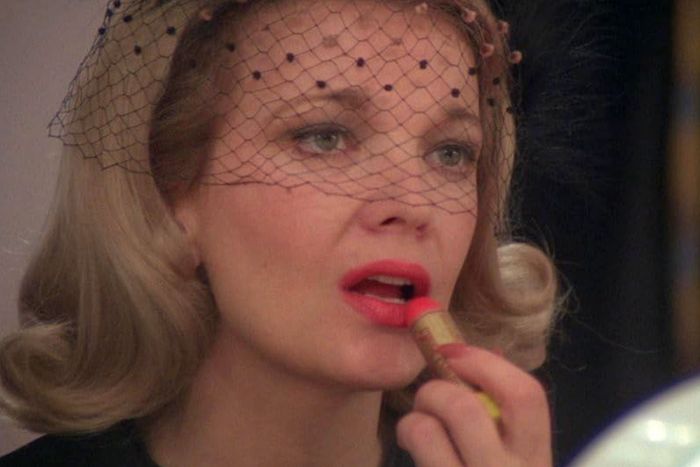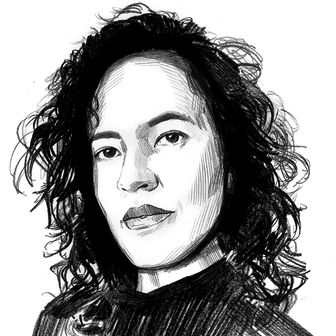
New York subscribers got exclusive early access to this story in our newsletter, The Critics. Sign up here to get it in your inbox.
This week, the actress Gena Rowlands died at the age of 94. To watch her onscreen is to be marked by her: In a moment, Rowlands could swing a character from combativeness to terrifying vulnerability. Flicking her glamour on and off like a light, she made you believe her women were fighting for their lives. Many of her best roles were in films directed by her first husband, John Cassavetes. But his 1989 death was far from the end of her career; she worked relentlessly until about a decade ago, as evidenced by the hilarious choice some obituary editors made this week when they wrote headlines that identified her as the actress from, of all things, The Notebook. (The movie was directed by her son, but still.)
Despite the torment of her most famous parts, Rowlands discussed her work in terms of high pleasure. She was a woman who loved, loved, loved acting. So I reached out to someone who loves, loves, loves actors. When I asked critic Angelica Jade Bastién if she was a fan of Rowlands, she said, “A fan? She is one of the best actors to ever be put to screen. She’s up there with Bette Davis for me.” And then she told me why.
I want to start from the very beginning of your relationship with Gena Rowlands as a performer. Do you remember the first
time you saw her in something?
The first time I was like, “Oh, who is that?” was when I was in high school and I saw Jim Jarmusch’s Night on Earth from 1991. In one of the segments Winona Ryder plays a cab driver and Rowlands plays her passenger, and I just liked her ease. Rowlands had such a grounded sense of herself as a performer and a quality where she didn’t have to push things. She never sucked up all the oxygen in the room.
If someone was curious about her, what would you tell them to watch?
Okay, I’m going to direct them to two very different movies. The first is maybe a little bit of an obvious pick, but I’m a huge fan of Opening Night, the film she made with her also incredibly talented partner, John Cassavetes, in 1977. Her character is an actress doing a stage play. Sometimes when actors play actors they get a little too obsessed with themselves. It turns inward and becomes a conversation only for other actors and film people, rather than using the role to get at bigger, more intriguing ideas. But Rowlands truly tried to have a conversation with her fellow performers, the scene, and the audience themselves. She knew how to thread the needle.
The other one is a TV movie that probably five people, including myself, have seen. It’s called Strangers: The Story of a Mother and a Daughter, from 1979. Rowlands played the daughter, and Bette Davis was the mother. I discovered it on YouTube, of all places, and that was a really big deal for me, because I love them both. Bette won an Emmy for it. The movie concerns them attempting to repair their estrangement after like two decades. One of them has been diagnosed with cancer, and that puts this clock on their reintegration into each other’s lives. I’m a sucker for a tense, fucked-up mother-daughter dynamic. We need more of those.
You know, the reputation is that Bette Davis’s heir apparent is Meryl Streep. Even Bette said that. I love Bette, but I’ve disagreed with her ever since I watched Strangers. It’s seeing these two women in communication with each other that made me realize Gena Rowlands is more Bette’s heir than Meryl. Gena took up the mantle of portraying female madness — both anger and mental illness — and the uncomfortable, prickly dynamics of being a woman in the world in a way that Bette Davis was very interested in. The movie acts as a passing of the torch.
Rowlands was so good at moving between registers. In Opening Night, her first lines are whispered through the cigarette gripped in her teeth. Then all of a sudden she’s performing onstage.
One great strength of Rowlands as a performer is that she could show the full breadth of a woman in very brief scenes. She’s playing women who are uncomfortable sometimes, prickly and self involved and kind of fucked up and up their own ass as well as hurt and very human. In Opening Night, it’s also fun watching her act against someone like Joan Blondell, an actress from the end of the studio system; you can see these different forms and eras of women’s acting come into the arena with one another. It was really interesting how Blondell was able to adjust to being in a Cassavetes film after at first being like, What the fuck am I getting into? There’s this raw current in all of Gena’s performances — she’s wearing her nerves outside of her skin, in a way, but she’s also someone who you can’t easily fuck with. She makes you wonder: What else does this woman have to show me?
Yes, like in the Opening Night scene where her colleague-slash-lover (played by Cassavetes himself) goes up to her and starts giving this speech, like, “I don’t even see you as a woman anymore. I see you as a professional … You don’t care about anything.” He’s trying to provoke her. And her response is just, “Okay.”
I mean, what do you say to a man like that, to be honest? That’s such an interesting moment because it speaks to how you get to the top of your game and men look at you very differently. Part of the allure of Rowlands and Cassavetes is we don’t get to see many heterosexual couples in the filmmaking scene who collaborate consistently and seem to have a very healthy — well, at least, a very passionate but committed relationship. How did these two people work together? How did they create such amazing films that are so charged with the nature of heterosexual dynamics and marriage? I don’t know. It’s really rare to see a man like Cassavetes recognize that the woman he’s with is so incredibly talented that he should just create altars to her talent. That’s what a film like Opening Night is.
Or A Woman Under the Influence, from 1974. She later told an interviewer that Cassavetes originally wrote that as a play for her to star in, and she refused, saying, “John, I couldn’t do this every night and twice on Wednesday and Saturday. I wouldn’t be able to last two weeks. I’d die.” So he rewrote it as a film. But she was always working, way beyond the stuff she did with him. That would be unusual now for an actor of her caliber.
Yeah, they don’t do that now. It speaks to a very, very different atmosphere, to someone who sees pleasure in the work. Think of all the television Rowlands did from the ’50s until 2010. I have a soft spot for her appearance in Columbo. She was really more of a working-class actor — as in, an actor who really worked. She was coming after the classic Hollywood actors who worked so much in part because they didn’t have a choice; the studio system ran all of them ragged. When I think of modern big-name actors, I’m like, Oh, God, these people are so spoiled. It’s insane to me that they’re making millions and millions of dollars but only doing one movie a year, two tops. The actors who came before them — and who were, in my opinion, more skilled — worked their fingers to the bone, doing sometimes five-plus movies a year and dying with not much money. I imagine that would make you approach the work very differently. It’s demystified. You don’t obsess over the glamour of it. You obsess over what you need to do, how you need to hit your mark, versus how important it is to your brand.
Or whether it will project a sense of exclusivity. Cate Blanchett is not going to be in any old project. She’s not like Gena, taking a little part on NCIS just to do it.
That’s right — one of her last TV appearances. I’m going to use Gena’s passing to get into stuff I haven’t seen that she was in, or stuff I haven’t seen in a while. This is kind of a weird one, but I want to rewatch this 2002 TV movie directed by Mira Nair called Hysterical Blindness with Uma Thurman, Juliette Lewis, and Ben Gazzara. I haven’t watched Cassavetes’s Gloria, so I’ll put that one in the mix. Even in movies that aren’t great, Gena Rowlands is always bringing it. The fact that everyone keeps talking about The Notebook I find fucking insulting. I’m not saying this lightly: Gena Rowlands is probably one of the top-five best actors who have ever appeared on screen and crafted a longstanding career. What she did reveals the complexity, the vulnerability, the harshness, the beauty, and the complication of what it means to be a woman, what it means to be alive, what it means to hunger and want to create art and want to be your own person. Bar for bar, most people cannot come for her. Brando, kiss my ass. Gena Rowlands every day.


